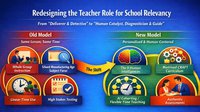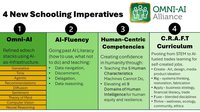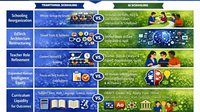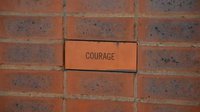In the learning process, better teaching, better facilities and better technology are important, but those are external factors. More important are the internal capabilities and stumbling blocks that each student brings to the learning experience. Neuroscience shows us how to impact the efficiency and effectiveness of the learning process by improving each individual’s underlying mental processing – that is, by changing the experience of learning from the inside out.
Every learner has learning abilities, also known as cognitive abilities or cognitive skills. Cognitive skills include many different mental processes that are important in learning and thinking. Some of the most important include Attention Skills, Visual Processing Skills, Auditory Processing Skills, Sensory Integration Skills, Memory Skills, Executive Functions, Logic and Reasoning and Higher-Order Executive Functions. Science no longer accepts that intelligence and the capacity to learn are fixed. Rather, it continues to document the critical roles that cognitive training and experience play in developing intellectual ability. In fact, cognitive skills account for 50 percent of the variance in students’ academic performance. That means that half of the difference between one child’s academic performance and the child sitting next to them can be predicted by their cognitive skills. Not teachers, class size, curriculum nor technology.
To say it plainly, if we shine the spotlight on and put our resources towards developing students’ cognitive skills, we are applying more leverage to reach the goals of student achievement than if we shine the spotlight on and put our resources into things that affect outcomes to a lesser degree. We are not suggesting that other factors can be ignored, only that we can no longer afford to ignore students’ cognitive development.
Despite the fact that underlying cognitive skills are essential to all learning, these skills are not generally taught in schools. Unfortunately, schools tend to assume that every student brings the necessary cognitive skills to the learning process, or as much of those skills as they will ever have. The fact that the development of cognitive skills is not explicitly taught in schools, however, does not mean that it cannot be taught. For over half a century, techniques to develop basic cognitive skills have been known and used in various clinical therapies. Today, these techniques can be delivered via computer-based programs effectively and on a much broader scale, making the delivery of cognitive training programs viable in a classroom setting to all students.
The importance of developing students’ cognitive skills becomes even more important and urgent as the educational system itself is under pressure to evolve.
From Passive to Active to Proactive Learners
The traditional educational model where students are viewed as passive recipients of information is being superseded by more hands-on approaches, like problem-based learning, flipped classrooms and interactive simulations. These approaches leave more room for students to engage, question and explore their own ideas. Portfolios and being able to choose how to demonstrate what they know give students more voice in their learning and more opportunity to express their unique perspectives, insights and experiences.
But just because students have the opportunity to take a leadership role in their education journeys does not mean that they have the capacity to do so. And the skills that more engaging learning experiences are designed to develop may not emerge simply because external constraints are removed. While every student possesses inherent curiosity and a natural desire to explore and discover, creativity, critical thinking, collaboration and other higher-level skills won’t simply happen because the system creates space for them. While higher-order thinking may have been stifled in traditional models that focused on memorization and measuring learning with standardized tests, it can emerge if students have the underlying cognitive skills that are required for higher-order thinking.
It may be helpful to consider some of the “21st Century Skills” that our evolving education system is prioritizing. Let’s start with problem-solving, communication and adaptability, as examples of higher-level skills required for success in more engaging learning experiences. We could look at others, but the same principles would apply.
Problem-solving involves defining problems, generating solutions and implementing those solutions. Abstract reasoning, and verbal or spatial reasoning are needed to define the problem and to build the reasoning that connects potential solutions to that problem. Cognitive flexibility is needed to generate possible solutions, and organizational skills are needed to manage the implementation of the chosen solution. Students with limited working memory capacity, poor cognitive flexibility and underdeveloped reasoning skills will flounder in problem-solving.
Communication involves verbal reasoning, inhibitory control (to not jump to conclusions or preempt others’ idea) and working memory (to hold various thoughts in mind and maintain the thread of a conversation). Students who lack solid verbal reasoning, inhibitory control and working memory skills will struggle with effective communication.
Adaptability and resilience are the sine qua non of problem-based learning and empowering students to take more responsibility for their own learning. Students must navigate challenges, adjust strategies and persist in finding solutions. Cognitive flexibility, one of the three executive functions we have continually referred to in this article, is fundamental to adaptability. Cognitive flexibility is a mental process, a cognitive skill. Some students shift gears effortlessly when their first approach to solving a problem doesn’t work. Others are confounded, become anxious and then retreat. And they do this because it simply takes much more energy for their brains to make those shifts.
Developing problem-solving ability, communication skills and creativity is fundamentally about developing the brain and its processing ability in each individual student. These are skills that cannot be taught through pure direct instruction. One wouldn’t, for example, assume that explaining the principles of pole-vaulting would suddenly imbue a student with the ability to coordinate muscles, brain, strength and balance to clear a bar. The same holds true for critical thinking and other prized 21st century skills.
While there is consensus regarding the importance of these skills, there is still a lack of knowledge in schools about how to help students develop and measure them. However, as we move away from measuring memorized content and toward measuring the effectiveness of mental processes, neuroscience is likely to become indispensable.
Cognitive training (which is also called brain training) involves activities designed specifically to strengthen one or more cognitive skills. Some cognitive training programs focus on individual cognitive skills, while more effective programs are comprehensive and integrated, focusing on a large number of cognitive skills at one time. They may be computer-based or use paper-and-pencil activities or a variety of other approaches.
Shifting the educational system as it has begun to do is one thing; developing the cognitive skills needed to thrive in that new system is just as important. We need to recognize that the available leverage of students’ learning capacity is a largely untapped source of improvement in educational outcomes. When students are empowered and actively engaged, education becomes a dynamic and transformative experience that prepares them for a rapidly changing world.
About the authors

Betsy Hill is President of BrainWare Learning Company, a company that builds learning capacity through the practical application of neuroscience. She is an experienced educator and has studied the connection between neuroscience and education with Dr. Patricia Wolfe (author of Brain Matters) and other experts. She is a former chair of the board of trustees at Chicago State University and teaches strategic thinking in the MBA program at Lake Forest Graduate School of Management where she received a Contribution to Learning Excellence Award. She received a Nepris Trailblazer Award for sharing her knowledge, skills and passion for the neuroscience of learning in classrooms around the country. She holds a Master of Arts in Teaching and an MBA from Northwestern University. Betsy is co-author of the new book, “Your Child Learns Differently, Now What?”

Roger Stark is Co-founder and CEO of the BrainWare Learning Company. Over the past decade, he championed efforts to bring the science of learning, comprehensive cognitive literacy skills training and cognitive assessment, within reach of every person, and it all started with one very basic question: What do we know about the brain? From that initial question, Roger Stark pioneered the effort to build an effective and affordable cognitive literacy skills training tool, based on over 50 years of trial and error through clinical collaboration. He also led the team that developed BrainWare SAFARI, which has become the most researched comprehensive, integrated cognitive literacy training tool delivered online anywhere in the world. For more, follow BrainWare Learning on Twitter @BrainWareSafari. Roger is co-author of the new book, “Your Child Learns Differently, Now What?”











